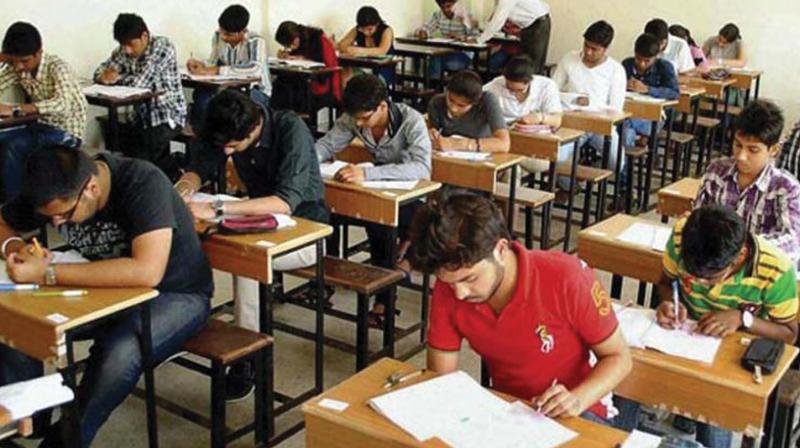Cent per cent' deception

In a few days the results of the class X examinations of the State Education Boards will be declared. It requires no clairvoyance to say that the percentage of students who clear the examination will be almost hundred percent. It is common knowledge that the percentage claimed to have passed is factually incorrect. Governments make it a matter of prestige to see that the pass percentage goes up every year presumably as a validation of the efficacy of their educational initiatives. In the euphoria of news- making victories of students and the ensuing jubilation, the unethical conduct of the education boards and the Governments go unnoticed. And it gets repeated as an unquestioned annual absurd ritual. The society has a right to know exactly how many students cleared the examination without any adulteration in their marks and how many got through with the gratis marks (normally called ‘moderation’). Of course when all the students pass the examination without any kind of grace marks or gratis marks to bridge the gap, it is an occasion to celebrate.
But does making the ineligible eligible by freely awarding the required marks to achieve a predetermined pass percentage call for any jubilation? It is, in fact, a dark moment. A moment darkened by two facts. The fact that a Government becomes party to this adulteration is a major cause of concern. Secondly, the manufactured success percentage obliterates the real causes of underperformance by students. As a result of this willful blinding towards truth, the failure of the school system to equip the students to achieve the required outcomes is neither admitted nor addressed. The ethical dimension of this phenomenon has wider ramifications. Legitimizing untruth can have unintended side effects. When a Government is involved in falsifying marks and percentages, the system loses the moral credibility to preach integrity and punish the corrupt.
If an official tinkers with statistics in his communication to higher authorities he is liable to be punished. And if the falsification has been made with reference to a document submitted in the Court or the Legislature, the consequences can be quite severe. When the student, even when he or she is a beneficiary of this ‘moderation’ (falsification) comes to realize that their teachers are also part of this ‘adjustment’ it instantly leads to an erosion of credibility. This has long term implications on the moral make-up and value system of the students in their adult life. What is being argued is not that we should, with a vengeance, declare all those who did not qualify as failed and thereby create a group of students who will eventually be marginalized and their upward mobility hampered. (In any case if their curricular outcomes are not sound their academic mobility will in case be compromised.) This misplaced kindness does great damage than good. Apart from providing a hollow gratification, it achieves nothing.
On the other hand, it blocks the essential process of introspection, diagnosis and correction. It prevents the genuine search for the academic and social causes that have made it imperative to award gratis marks. It obliterates the larger issue why a large number of students continue to flounder in several subjects after ten years of schooling. This perverted and shortsighted practice effectively prevents us from asking these crucial and disturbing questions. The student who spends ten long years should have been empowered by thoughtful and rewarding techniques to overcome their limitations and difficulties.
The system of automatic promotion of all the students to higher classes also hides from us the real academic picture. However, the school authorities ought to know the real weaknesses of individual students. Even as they are promoted to the next class, there has to be an effective system to identify the weak areas of each student and provide supplementary learning in those subjects. If this supplementary corrective and nourishing programme is formulated carefully and implemented diligently, there will be no need for Examination Boards to enact every year the unholy drama of tinkering with marks and percentage of pass.
Those who are indignant about the unkindness and elitism alleged in proclaiming the true results are turning a conscious blind eye to the consequences of dishonesty and the disservice being done to such students in the long run. To begin with, let the society know how many students really cleared the examinations on their own and how many were pushed to the other side with gratis marks. At least that will force parents to ask what schools were doing with their wards for ten long years. That will force the society to turn the spotlight on the class rooms and appreciate the real ailment and understand the infirmities in our educational process. And that is a question that augurs well for the future of our students, many of whom are now being let out with an almost fake passport to higher studies. As Aldous Huxley said famously: “Facts do not cease to exist because they are ignored.”
(The author is former Chief Secretary, Government of Kerala and founder V-C of Thunchath Ezhuthachan Malayalam University)

